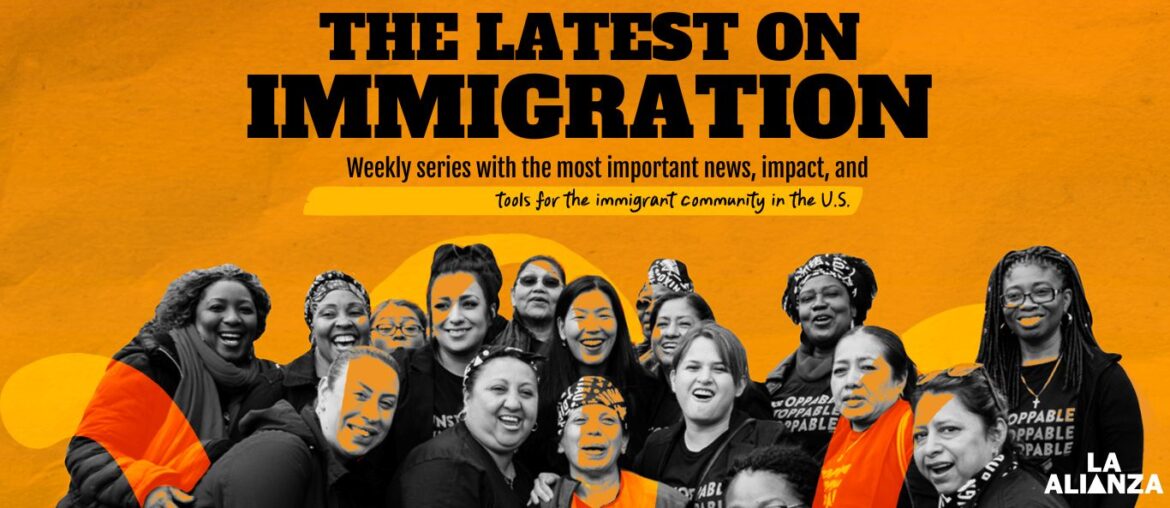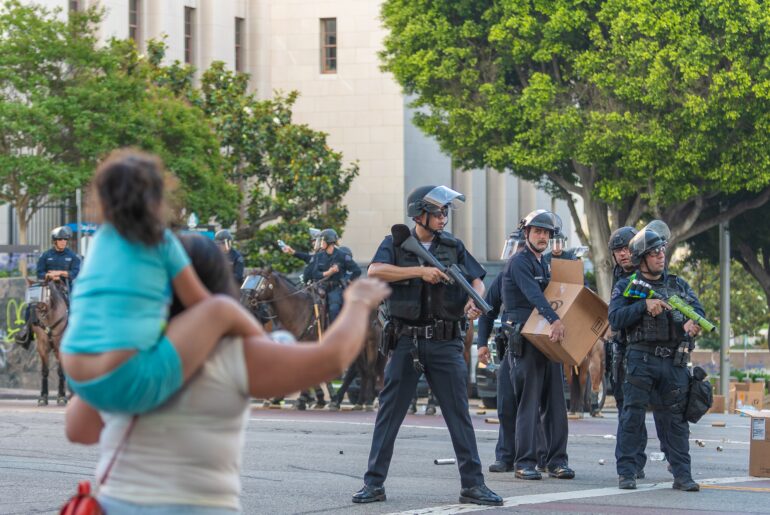This is a summary of the most relevant immigration news from June 19 to June 25, 2025. This week, the federal government has intensified its deportation policy through new workplace raids, the use of health data for immigration purposes, and the presence of undercover agents in public spaces. At the same time, communities and local governments have begun to respond with protests, lawsuits, and calls for the protection of civil rights.
Recent news
The government shares immigrants’ medical data with immigration agents: An investigation revealed that the Trump administration has been sharing personal information, including the immigration status of millions of people enrolled in Medicaid, with the Department of Homeland Security (DHS), facilitating their location and possible deportation. Internal documents show that Medicare and Medicaid program officials expressed legal concerns about this practice.
- What we know: The revelation prompted an immediate reaction from local officials, including the state of Washington, California Governor Gavin Newsom, and several members of Congress, who demanded an immediate halt to the use of this information. The practice could violate federal privacy laws and has sown fear among public health beneficiaries.
- Why it’s important: The use of medical data for deportation purposes represents a break with medical confidentiality policies. It also affects families with different immigration statuses who, out of fear, may stop accessing essential health services.
- What you can do: It is recommended that you do not cancel health coverage without first consulting with a specialized attorney.
Undercover agents conduct raids in multiple cities: In recent weeks, there has been an increase in immigration raids involving plainclothes agents wearing hoods and without visible badges. These actions have taken place in public places and workplaces in cities such as Los Angeles and New York, causing confusion, fear, and protests.
- What we know: Arrests have been reported at textile factories, store parking lots, schools, and immigration courts. In New York, masked agents detained people outside federal courts without identifying themselves or explaining their reasons. In Los Angeles, the most visible case occurred at Dodger Stadium, where federal agents were seen in the parking lot, sparking protests. Although ICE denied involvement, the Dodgers confirmed that they denied entry to the agents.
- Why it’s important: The use of unidentified agents has raised concerns among residents and civil rights advocates, who point out that these tactics make it difficult to know whether those making the arrests are actually from a government agency. There have also been reports of incidents in which people were detained without knowing which agency was in charge or without receiving a clear explanation.
- What you can do: When confronted by unidentified agents, it is recommended that you do not sign any documents without legal advice, avoid confrontation, and record any incidents. The red cards from the Immigrant Legal Resource Center (ILRC) are a key tool for understanding and exercising your constitutional rights during an encounter with immigration agents.
Trump reverses pause on workplace raids and announces new operations: After briefly suspending raids on hotels, restaurants, and farms, the administration announced the immediate resumption of operations, arguing that no sector is exempt from complying with the law. The decision contradicts previous statements in which the president had described these workers as “irreplaceable.”
- What we know: The new guidelines instruct ICE to continue raids, even in essential sectors, with priority given to individuals with criminal records. Although the operations focus on individuals with criminal records, internal data shows that more than 75% of those taken into ICE custody since October had no serious criminal convictions, and less than 10% were convicted of crimes such as murder, robbery, or rape.
- Why it’s important: This decision reinforces the climate of insecurity in economic sectors that depend on immigrant labor. In cities like Los Angeles, small businesses have reported drastic drops in revenue, with markets and restaurants nearly empty due to customers’ and workers’ fear of being detained. Local merchants have compared the impact of the raids to the worst moments of the pandemic.
- What you can do: Workers in these sectors should know their rights in the workplace. It is recommended to consult with labor organizations or local coalitions that provide free legal guidance. It is also helpful to have a family emergency plan and keep important documents accessible.
ICE intensifies arrests in Democratic cities and increases detentions in operations without warrants: President Trump ordered an expansion of deportations in cities such as New York, Chicago, and Los Angeles. The raids include detentions during immigration, appointments, routine checks, and surprise operations.
- What we know: The administration has mobilized resources from multiple agencies to achieve a quota of 3,000 arrests per day. One of the most controversial cases last week occurred in California, where Adrian Martinez, a 20-year-old U.S. citizen, was mistakenly arrested while working at a Walmart. The incident, captured on video, shows how he was surrounded by armed agents and knocked to the ground.
- Why it’s important: The mass raids are sparking nationwide protests, amid growing concerns about the legality of the actions and racial profiling.
- What you can do: It is recommended to have a family emergency plan, avoid traveling with false documents, and attend hearings with an escort. In addition, experts recommend not making hasty decisions and verifying all your legal options.
Developing Stories and Local News
These are stories and legislation that are developing or in the pipeline. Details could change:
- Federal judge blocks policy linking transportation funds to immigration cooperation: A Rhode Island court issued an order preventing the Department of Transportation from denying funds to states that do not cooperate with ICE, ruling in favor of 20 states that sued the federal government.
- North Carolina governor vetoes two bills that could force state police to cooperate with ICE and make it harder to access public services.
- Teenager with no criminal record deported in Ohio: Emerson Colindres, 19, was deported after an appointment with ICE despite having no criminal record. His case sparked outrage among his community, which describes him as an exemplary young man.
- US considers imposing travel ban on 36 additional countries: A diplomatic note from the State Department suggests that new restrictions could take effect in August. It would be the largest expansion of immigration bans under the Trump administration.
The numbers
- ICE has made more than 100,000 arrests so far this year, far exceeding previous figures.
- The Trump administration’s proposed budget includes $75 billion to hire 10,000 additional ICE agents.
- According to a Pew Research Center study: 60% of Americans disapprove of the suspension of asylum applications. 54% disapprove of workplace raids. Only 9% of Democrats approve of Trump’s immigration policy, compared to 78% of Republicans. 53% believe these policies will increase public spending, and 46% believe they will weaken the economy.
Resources
- For more help, visit the National Domestic Workers Alliance’s “Know Your Rights” hub. It includes immigrants’ rights, immigration options, and a legal aid directory, among other resources. To access the information, visit ndwa.us/immigrant.
- To identify reliable information, visit: How to identify fake news about immigration and avoid misinformation.
Legal Disclaimer: This information is provided for educational purposes and does not constitute legal advice. It is recommended that you consult with an immigration attorney to assess your specific situation.






